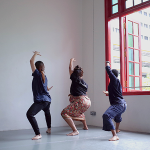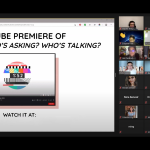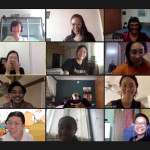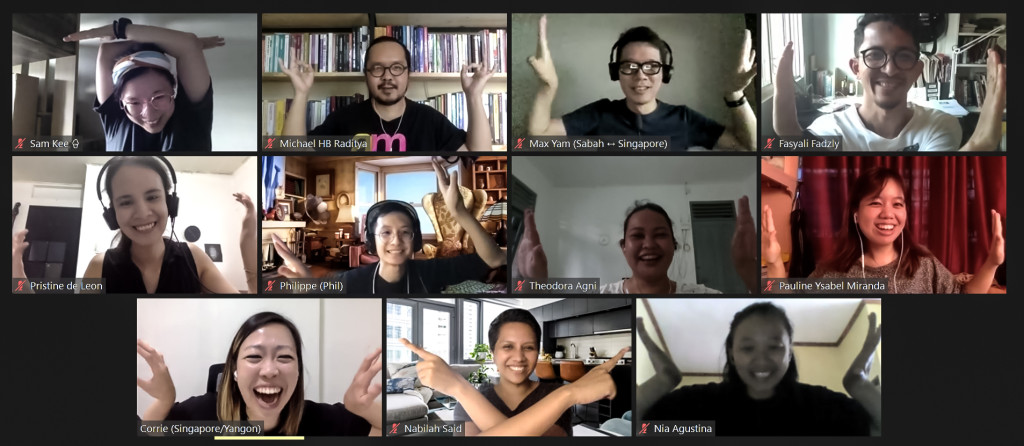
Critical Ecologies| Critical Anomalies doing an activity following one of their brainstorming sessions. The entire residency is held over Zoom as the members are from different Southeast Asian regions.
The COVID-19 pandemic has forced us to find new ways to think, work and play. While physical presences are crucial to human relationships and well-being, digital spaces can offer us creative alternatives to the way we connect, even offering opportunities to form global networks.
C42 restructured our residency programmes to adapt to the changing needs and circumstances of our community. One new programme is the Co-Lab Residency.
As its name suggests, Co-Lab is for collectives, inspired by laboratory-style experimentation and investigation, and altogether focuses on collaboration. The aim of Co-Lab is to create and grow ecologies of creativity and expertise. Co-Lab can take place in a physical space, a digital one, or a mixture of both.
Co-Lab is artist-centered – this means the Co-Lab Resident Collectives are allowed to determine for themselves what outcomes they would wish to achieve within the residency period, and how they wish to achieve them. It’s not just about devising new creations, but also new ways of creating and exploring.
In addition, Co-Lab encourages knowledge-sharing. Resident Collectives will be given opportunities to gather and discuss their explorations and processes. These sharing sessions may also be extended to the other residencies at C42.
Brown Voices
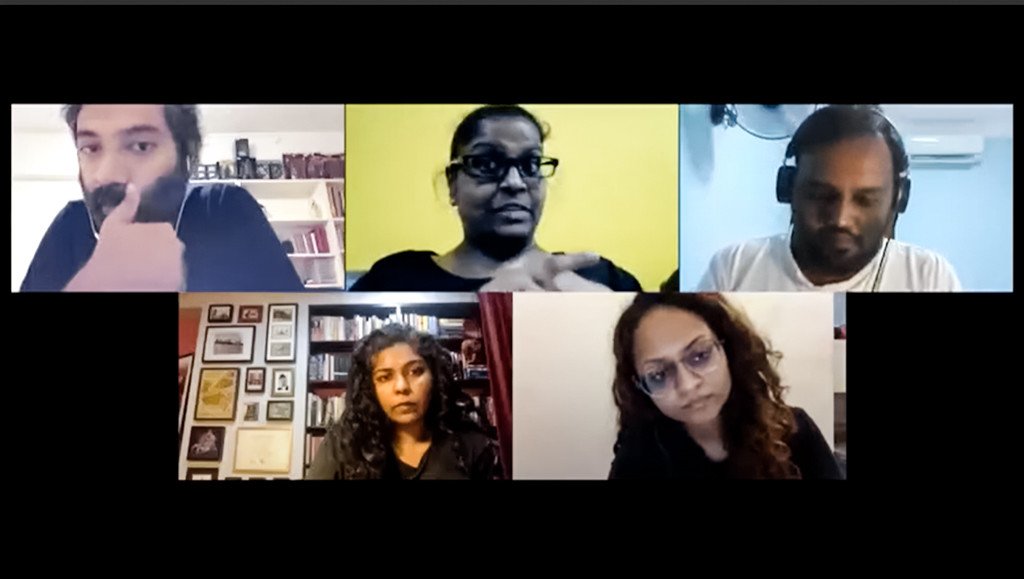
Brown Voices at one of their monthly meetings held over Zoom.
Brown Voices (BV) is Singapore’s first collective of Indian theatre practitioners and playwrights. A 12-member team, founded by freelance Indian actor-director-playwright Grace Kalaiselvi, BV supports, encourages and trains play-writing, especially for quality play scripts where the narratives by Indians in Singapore take centre stage. The group previously had their regular meetings at C42, and made their debut with a reading of original works at C42’s Late-Night Texting 2019.
BV is no stranger to adapting their practice and expanding their reach. In February 2020, they were already forming regional connections, having conducted networking sessions online with Malaysian Indian playwrights. They also had public online discussions on their writing.
Since the move to the cloud, they have found their stride in online monthly meetings. In Co-Lab, BV will be presenting a whole host of workshops and play-readings in 2021, where members will be sharing on their topics of interest and how they may intersect with theatre, as well as freshly written scripts.
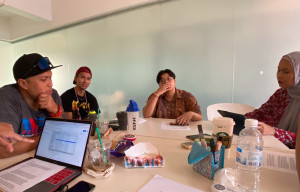
Members of the Main Tulis Group having their monthly meetings
Main Tulis Group
Formed in 2016, Main Tulis Group (MTG) is Singapore’s first collective that works on developing English and Malay plays. With “main” meaning play in Malay, the group emphasises writing organically, without restrictions.
They are keen to exchange ideas and provide critique, with the aim of producing more original writing for the stage. Like BV, MTG has also regarded C42 as their home base, and has been a frequent feature at Late-Night Texting since 2017.
The group also organises regular readings of works-in-progress, conducts outreach events on writing, and mentors young writers. Members have also conducted playwriting workshops for each other, in areas such as adaptation and translation.
As part of Co-Lab, look out for MTG’s Script Circles, public sessions in which to share scripts to gain feedback or to learn about playwriting. Script Circles are slated to begin later in 2021.
Critical Ecologies | Critical Anomalies
Critical Ecologies | Critical Anomalies, led by arts researcher and writer Corrie Tan, consists of a team of 12 critics, writers, documenters and translators from Singapore, the Philippines, Indonesia and Malaysia.
They have come together to imagine what performance criticism and critique located in and emerging from Southeast Asia might look like and how it can be theorised and documented.
In their attempts to formulate a regional understanding of criticism, the team has been meeting online in focus group discussions to unpack the practice. They will also be running workshops to facilitate mutual support and sharing of individual expertise.
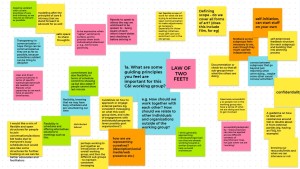
A screen grab of a Google Jamboard used to capture thoughts and ideas during a brainstorming session from The Care & Intimacy Working Group.
Care and Intimacy Working Group
The Working Group emerged from a strong desire and need to be intentional about having more conversations about care and intimacy practices in the local arts scene. Made up of 20 members and divided into smaller sub-groups, they have been exploring and mapping information and knowledge on maintaining care in arts disciplines.
They are also invested in holding space for people to have these conversations about care, and advocating for broader considerations of care and intimacy, and the minimization of harmful practices across in the arts. The Working Group hopes to develop new best practices that we can adopt collectively.
By Lee Shu Yu
Published on 24 May 2021


